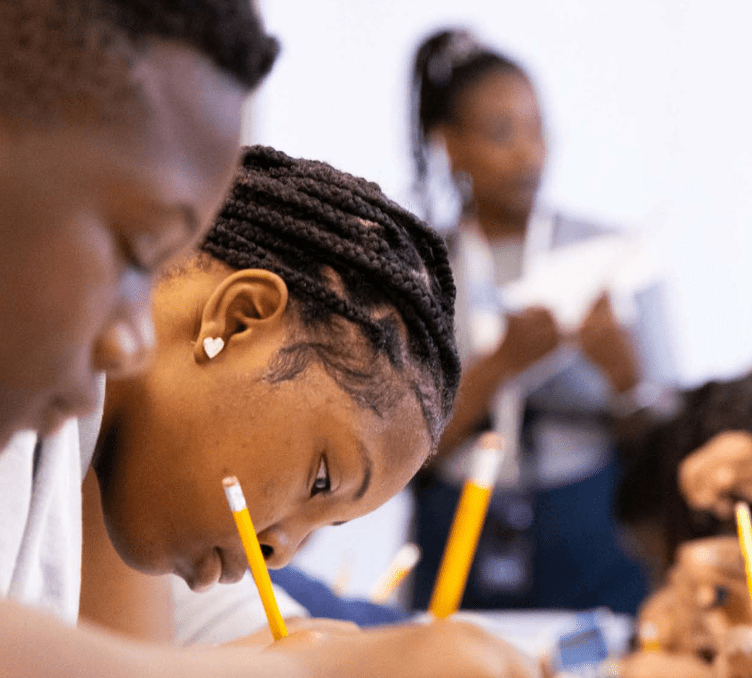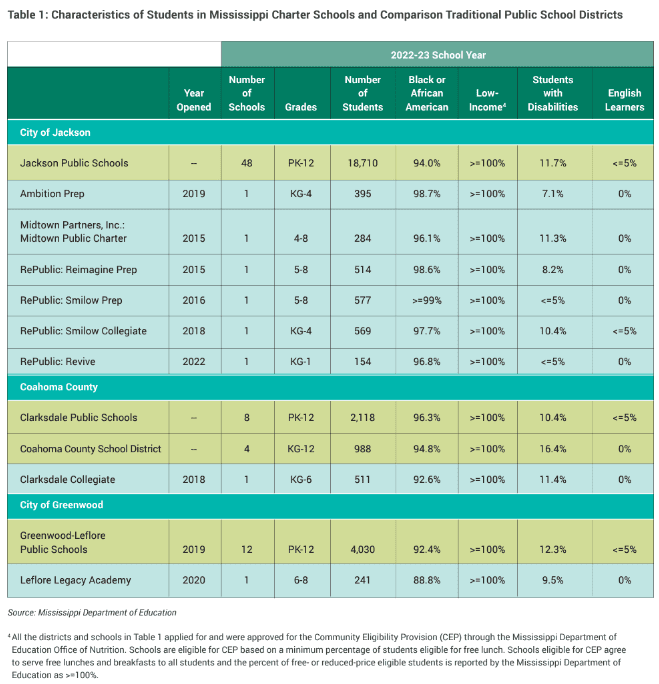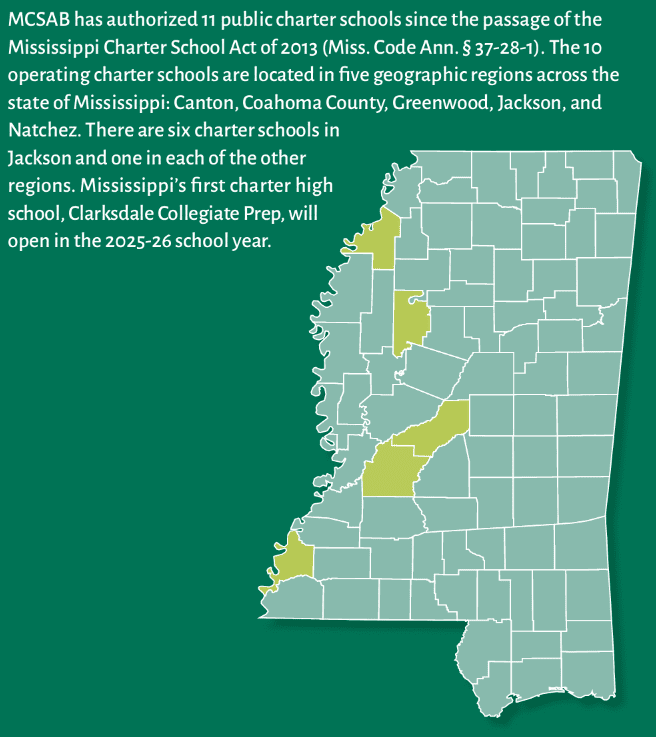
(Photo from MS Charter School Authorizer Board annual report)
- Demand for charter schools in the Magnolia State remains high, with more students who want to attend a charter school than seats available.
A recently released annual report from the Mississippi Charter School Authorizer Board shows that charter schools are facing similar challenges as other public schools in the state, as is much of the nation following the pandemic.
Last week, the latest Annie E. Casey Foundation’s KIDS COUNT® Data Book outlined the “unprecedented declines” in student math and reading proficiency the Foundation says were largely brought on by the COVID-19 pandemic’s effect on education. Mississippi’s students were part of those trends, although not as significantly impacted as some other states.
Charter schools in the Magnolia State became an option for school districts rated D or F in the state’s assessment ranking nearly a decade ago. The first charter school opened in Mississippi in 2015.
Today, there are 10 charter schools in operation in Mississippi, six of which operate within Jackson’s municipal boundaries. The other four are located in Canton, Coahoma County, Greenwod and Natchez.
Empower Mississippi CEO Grant Callen told Magnolia Tribune that the biggest barrier to growth of the charter sector is the statutory limit on what communities can apply to open a charter.
“Out of nearly 140 school districts in the state, only six are currently rated D or F, so only six communities are permitted to create a charter school,” Callen said.

He added that HB 1683 could have allowed C rated districts to have charter schools if it had passed during the 2024 legislative session. However, the bill did not make it to the governor’s desk, dying in committee late in April.
“We got close this year, so I’m optimistic that next legislative session lawmakers will see the benefits of allowing families in more communities the option of attending a charter school,” Callen added.
Over 3,000 students are enrolled in charter schools in Mississippi. All are either elementary or middle school aged students. The first charter high school, Clarksdale Prep, is slated to open in the 2025-2026 school year.
“It didn’t happen overnight, but today, 3,400 students and 266 teachers are experiencing the life-changing power of ‘choice’ right here in Mississippi’s charter schools,” Callen explained.
The vast majority of those students and families are black or African American and considered to be low-income. Callen said students, families, teachers, and communities are benefiting from these unique education options, and “that’s worthy of celebration and offering to more families in more communities.”

Data provided by Basis Policy Research, an independent research firm, show signs of improvement in Mississippi charter schools as well as similar deficiencies seen post-pandemic around the nation based on assessment tests.
“Running a school is hard work, especially in Mississippi’s poorest neighborhoods, and charter schools aren’t immune from challenges. And a quick look at the recently released 2022-23 Annual Report of the Mississippi Charter School Authorizer Board reveals some highs and some lows,” Callen added.
The report notes that this was the first year since the 2017-18 school year that charter school students did not outperform traditional public school students in math. Elementary charter students were noted as performing lower in math than students in traditional public schools but had the same statistics when it came to English Language Arts (ELA) performance during the 2022-2023 school year.
While students in middle charter schools performed the same as students in traditional public schools in math and ELA, sixth grade charter students outperformed traditional public school students in both subject areas.
On the school level, students attending Clarksdale Collegiate performed better than traditional public school students in ELA.
Mississippi Charter School Association Executive Director Jonas Crenshaw said students in charter schools take the same state assessment tests as students in every other public school across Mississippi.
“I think charter schools have an opportunity to improve their performance on state assessments,” said Crenshaw. “If you look historically though, prior to the last couple of years, charter school performance was pretty good.”
As for Kindergarten readiness and growth, for the 2022-2023 school year, students at Ambition Prep saw kindergarten readiness improve more than the statewide average. In fact, every elementary charter school saw larger increases in that category than comparison public school districts.

“Kindergarten readiness is something that our schools are doing a great job with, and I think it just shows what is possible once students begin with us and when we create those relationships with parents and help parents with strategies,” Crenshaw said.
He added that one of the things that makes Ambition Prep stand out is the school’s use of two certified teachers per classroom from Kindergarten through second grade.
“Which really allows them to work in a more targeted manner with students in each of those early grades,” Crenshaw elaborated. “That has really paid dividends for Ambition Prep in those early grades.”
In relation to attendance, all elementary charter schools during that school year saw a decrease in chronic absenteeism, while middle charter schools experienced an increase. Midtown and Reimagine Prep saw rates of chronic absenteeism that were higher than the comparison public schools.
But as Callen notes, chronic absenteeism in Mississippi charter schools is lower than the national average.
“High parent satisfaction rates and other indicators of demand like waitlists demonstrate that parents like what they are experiencing in charter schools and want more of it,” Callen stated. “Yet, when you look at the academic performance data of the charter sector, it’s clear that these schools have more work to do. Last year’s results especially left a lot to be desired.”
Since becoming executive director, Crenshaw has been taking a monthly look at each school’s improvement systems and addressing their needs assessments through meetings with each school’s administration.
“The association has actually provided schools up to $20,000 for professional development tied to their needs assessment,” he added.
Consulting firms are also being brought in to provide tutorial assistance that can increase student test scores and to implement a unified method to monitor student growth, providing an apples-to-apples comparison model to make informed decisions.

“So, it’s been a year of learning, and our charter schools are resilient,” Crenshaw elaborated. “We have excellent leaders in our charter schools and families love the experience they get.”
As students remain in charter schools for longer, Crenshaw said teachers will have more opportunities to help students grow and overcome their deficits.
“I think what you will see is the longer students are with the charters schools the better they perform,” Crenshaw described. “So, there is an abundance of national research that supports that trend as well and we definitely see that in our schools.”
The report did note a continuing demand for charter schools. An overall demand ratio of 0.25 percent for charter schools is cited in the report, meaning there are more students who wanted to attend a charter school than seats available.
However, a decline in traditional public school enrollment could hinder the creation of additional charter schools. Public school enrollment declines have been attributed to a reduction in state population coupled with parents choosing other options such as homeschooling.
“We have been able to retain families year over year and do a good job of student retention,” Crenshaw said. “And families have been our best cheerleaders.”
You can read the full report from the Mississippi Charter School Authorizer Board here.










